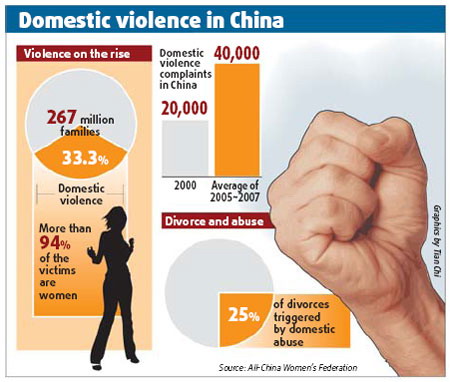
|
CHINA> National
 |
|
Pulling no punches against domestic abuse
By Wang Ying (China Daily)
Updated: 2008-11-25 07:46  Chen Benjian, director of China Law Society's Center for Combating Domestic Violence, agrees: "Above all, we need an anti-domestic violence law that experts have been seeking for more than five years." "Studies show domestic violence, physical and mental alike, can take place in families of any social class," Chen says. "Living without violence is the right of every family member. Community intervention can greatly help reduce such violence," Chen says. Organizations and research institutes such as the Maple center and the Legal Center of Peking University, too, have sought laws to protect victims of domestic violence. Maple center director Hou says she expects legal steps to be taken across the country to remove wife-abusers from the family and to re-educate them. Seven State agencies, including the ministries of public security, justice, civil affairs and health, issued a joint statement last month urging policemen answering calls on the hotline (110) to respond to domestic violence complaints. But even though the criminal law does not exclude private matters, police are reluctant to deal with "family affairs", China Politics and Law University professor Xia Yinlan says. Police start investigating a domestic violence case only after someone is killed or seriously injured. "That only brings perpetrators of crime to justice but does not help prevent such incidents it does not protect the victims' rights or interests, either." Though police in Liaoning province began responding to complaints against domestic violence four years ago, such interventions can only deal with emergency situations and cannot be the final solution. What makes matters complicated is that prosecutors in some cities regard "wife-beating" as a private matter. Even the Beijing procuratorate introduced a rule in 2002 to exclude "light injuries" cases, including domestic violence, to cut costs. The first legal definition of domestic violence came as late as in 2001, when the revised Marriage Law defined it as "an act involving beating, tying-up, mutilation and forced restriction of personal freedom, which causes a family member physical or mental harm". But even that is "far from perfect because it lacks clarity on enforcement", Xia says. Since there is no specific law on domestic violence, such cases are dealt with under broader women's rights and anti-violence legislation such as the 1992 Law on the Protection of Rights and Interests of Women and the criminal law that covers deliberate injury caused within families, which carry less harsh punishment. "A combination of a bias against domestic violence and weak law enforcement have forced victims to sometimes turn to desperate measures," says researcher Chen Min of the Supreme People's Court. More than half of the women imprisoned in recent years are victims of domestic violence who took revenge on their abusers. In the 1970s, American forensic psychologist Lenore Walker coined the phrase "battered woman's syndrome" to explain the extreme behavior women who suffered from long-term violence took against their abusers. Battered woman's syndrome has been used as a defense for women charged with murder for killing their abusers. Although Chinese law acknowledges the right of self-defense, it does not consider the psychological state of battered women. As a result some of the battered women who killed their male abusers have been treated like common criminals and charged with murder, Chen Min says. But despite not having a specific law on domestic violence China has taken strides, especially after the 1995 Fourth World Conference on Women in Beijing, to protect domestic violence victims. Twenty-five provinces, autonomous regions and municipalities have already introduced anti-domestic violence regulations, largely because of the efforts of local women's NGOs and women's federations. Apart from that, several civil affairs departments have set up shelters for women, and some women's organizations and health departments have jointly set up domestic violence injury identification centers. "Elimination of domestic violence requires the efforts of the whole of society," Chen Benjian says. "We need to establish a set of effective measures to curb domestic violence so that the perpetrators are punished From a social and cultural perspective, we have to build gender equality and make domestic abuse socially unacceptable. Above all, women have to learn to say 'No' (to violence) bravely." That is exactly what Maple center's counselor Xie Hua has told Li Li. When Li said, "Sometimes I hate myself for being such a coward but I dare not defend myself for fear of inviting more trouble", Xie told her that "too much tolerance and too many concessions sometimes invite more violence". After talking with Xie, Li has promised to defend herself and seek community help if her husband beats her again. |
主站蜘蛛池模板: 免费v片在线看 | 欧美激情欧美狂野欧美精品免费 | 亚洲国产精品第一区二区 | 日韩区在线 | 久9这里精品免费视频 | 免费久久精品 | 国产精品久久久久久久久久久久久久 | 国产在线精品二区韩国演艺界 | 国产在线一区二区三区四区 | 久久亚洲一级α片 | 99久久国产免费 - 99久久国产免费 | 免费看又黄又爽又猛的网站 | 日韩久久网 | 国产精品精品国产一区二区 | 免费一级a毛片在线播放 | 久久久免费 | 久久99国产乱子伦精品免费 | 亚洲精品www久久久久久久软件 | 亚洲高清二区 | 一区二区三区视频观看 | 在线欧美不卡 | 国产精品久久久久久一区二区三区 | 手机看片自拍日韩日韩高清 | 一本色道久久综合亚洲精品加 | 精品成人一区二区三区免费视频 | 欧美视频久久 | 国产成人a一在线观看 | 欧美一级特黄特色大片 | 在线播放人成午夜免费视频 | 精品在线网站 | 亚欧色视频在线观看免费 | 在线免费一区二区 | 87精品福利视频在线观看 | 澳门一级毛片手机在线看 | 韩国一级淫片视频免费播放 | 日韩一级影院 | 欧美日韩亚洲高清不卡一区二区三区 | 欧美三级网 | 欧美区一区二区三 | 美国毛片网 | 在线 中文字幕 日韩 欧美 |